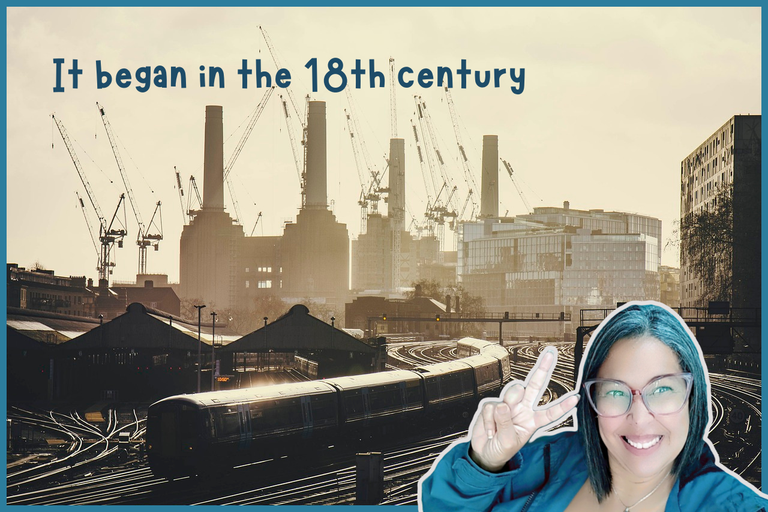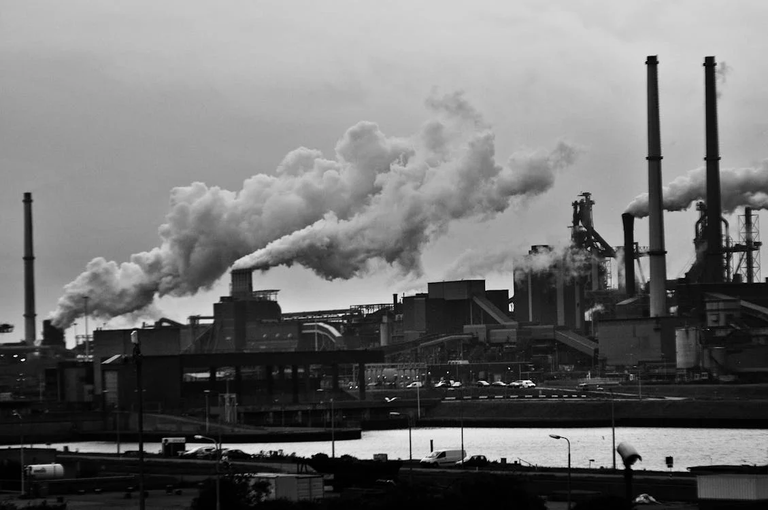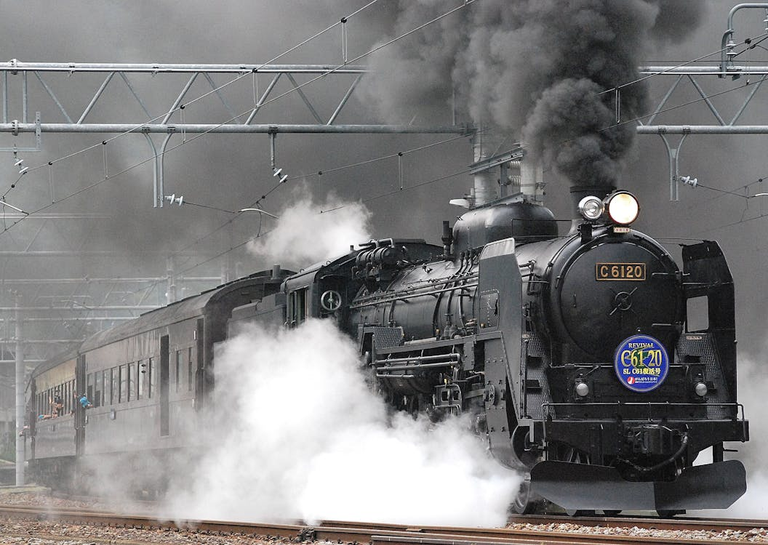
In my most recent publication in the community, I mentioned some inventions and discoveries and alluded that among them some have marked a before and after, among the discoveries or inventions that have revolutionized humanity is the steam engine that brought along with it the industrial revolution.
I can not fail to mention that touching this topic reminds me of my universal history classes in high school, which I loved, because they allowed me to see a panorama beyond the borders of my country and how events occurred in distant places influenced the entire humanity; now returning to the subject according to the various data the industrial revolution began in the second half of the eighteenth century approximately in 1760.
The industrial revolution was characterized by a change in the modes of production and economy in general, which until then had been based on craftsmanship, trade and agriculture to one of a mechanical, industrial and urban character, which brought about many changes for the society of that time.

To date, it is considered that the industrial revolution began in Great Britain, spreading to Europe and then across the ocean, reaching the American continent, specifying the USA.
Now, this change marked a point of no return, as assembly companies were born, machines became known and necessary everywhere. The human part was still present, but the introduction of machines in all aspects of life and production began.
There began the process of factory automation that continues to this day, a transition that has not ended, the years of human labor, which was based on manual labor was and continues to change and in some cases ended, for example in terms of the use of animals for pulling or pushing, which I think is wonderful, as they were replaced by machinery that came and gave better results.
The industrial revolution brought with it its pros and cons. I believe that the pros were immediately appreciated and the cons are still appreciated today and we see them more clearly three centuries after their arrival. Among the pros we have that wealth and per capita income multiplied.

Prices went down, structures improved, new technologies and opportunities were developed, in general we could say that it changed the way of life that existed until then.
Now among the cons, there is obviously the pollution of the air, sea and soil as industries and transports (trains and ships) that used coal and fossil fuels grew, without forgetting the growth of the cities as there was a migration from the countryside to the cities in search of employment, which also brought a decrease in agricultural production.
Also the deplorable working conditions, the exploitation of workers, which brought struggles for improvements in terms of working hours, better working conditions and more.
The industrial revolution changed the way the world was produced, worked, transported and lived until the 18th century and since that first revolution that brought mechanization (hydraulic power, steam engine) three more have come after them, such as the electric, computer and the most recent revolution of digitalization.
In short, after that first step with the arrival of the steam engine, we see a before and an after that in many ways was and is beneficial to humanity, but also brought other consequences that have been detrimental to humanity and the planet we inhabit, which should lead us to reflect on how necessary are really some of these advances or discoveries.
So I say goodbye to my participation in the topic proposed for November 04 of Monthly Prompts | November INLEO
Versión en Español (Pulse aquí)
En mi más reciente publicación en la comunidad, hice mención de algunos inventos y descubrimientos y aludí a que de entre ellos algunos han marcado un antes y un después, entre los descubrimientos o inventos que han revolucionado a la humanidad está la máquina de vapor que trajo junto a ella a la revolución industrial.
No puedo dejar de mencionar que tocar este tema me hace recordar mis clases de historia universal en secundaria, las cuales me encantaban, pues me permitían ver un panorama más allá de las fronteras de mi país y como hechos ocurridos en lugares lejanos influyeron en la humanidad entera; ahora regresando al tema de acuerdo a los diversos datos la revolución industrial comenzó en la segunda mitad del siglo XVIII aproximadamente en 1760
La revolución industrial se caracterizó por un cambio en los modos de producción y de la economía en general, que hasta el momento se habían basado en artesanía, comercio y agricultura a una de carácter, mecánico, industrial y urbano, lo que trajo como consecuencia muchos cambios para la entonces sociedad de ese momento.
Hasta la fecha se considera que la revolución industrial comenzó en Gran Bretaña, extendiéndose a Europa y luego por el océano, llegando al continente americano, especificarte a EE. UU.
Ahora bien, ese cambio marcó un punto de no retorno, pues nacieron las empresas ensambladoras, las máquinas se hicieron conocidas y necesarias en todas partes. La parte humana continuaba presente, pero se comenzó la introducción de las máquinas en todos los aspectos de la vida y producción.
Allí comenzó ese proceso de automatización de las fábricas que hasta el presente continúa, se comenzaría una transición que no ha terminado, los años de mano obra humana, la cual estaba basada en de trabajo manual fue y continúa cambiando y en algunos casos acabo; por ejemplo en cuanto al uso de los animales para arrastre o empuje lo que me parece maravilloso, ya que fueron sustituidos por la maquinaria que llegaba y daba mejores resultados.
La revolución industrial trajo junto a ella sus pros y sus contras. Creo que los pro que apreciaron de inmediato y los contra todavía hoy los apreciamos y vemos de manera más nítida tras tres siglos de su llegada. Entre los pros tenemos que la riqueza y la renta per cápita se multiplicaron.
Los precios bajaron, las estructuras mejoraron, se desarrollaron nuevas tecnologías y oportunidades, en general se podría decir que cambio el modo de vida que existía hasta el momento.
Ahora entre los contra, está obviamente la contaminación del aire, mar y suelo al crecer las industrias y transportes (trenes y barcos) que se usaban carbón y combustibles fósiles, sin olvidar el crecimiento de las ciudades al producirse una migración de los campos a las ciudades en busca de empleo, lo que también trajo una disminución de la producción agrícola.
También las condiciones deplorables de trabajo, la explotación de los trabajadores, lo que trajo las luchas por mejoras en cuanto a horario, mejores condiciones de trabajo y más
La revolución industrial cambio el modo en el que se producía, trabajaba, trasportaba y vivía el mundo hasta el siglo XVIII y desde esa primera que revolución que trajo la mecanización (energía hidráulica, máquina de vapor) han venido tras ellas tres más, como la eléctrica, la informática y la más reciente la revolución de la digitalización.
En resumen, tras ese primer paso con la llegada de la máquina de vapor, se ve un antes y un después que en muchos aspectos fue y es de beneficio para la humanidad, pero también trajo otro tipo de consecuencias que han sido perjudiciales para la humanidad y el planeta que habitamos, lo que nos debería llevar a una reflexión de que tan necesarias son realmente algunos de esos avances o descubrimientos.
Así me despido de mi participación en el tema propuesto para el día 04 de noviembre de Monthly Prompts | noviembre INLEO



Posted Using InLeo Alpha
Fortalecer los pros, y buscar solucionar los contras es el camino a seguir, para lograr un mejor progreso humano.
!PIZZA
Esa es la idea que lo positivo sea más y mejor que lo negativo y de preferencia que los contras no existan (creo que es algo imposible), sean corregibles o de muy poco impacto
$PIZZA slices delivered:
(3/10) @jesusalejos tipped @actioncats